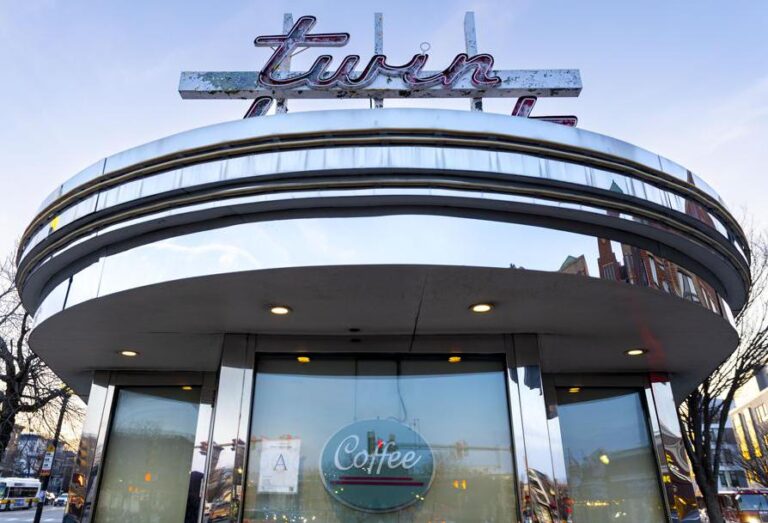
t was like old times at Twin Donuts in Allston over the weekend, as dozens of people lined up under the shop’s classic 1950s neon sign and well down the sidewalk. Inside, breakfasters of all ages packed the mismatched tables and red leather counter seats.
But the nostalgic rush of business for the 70-year-old diner’s sweet treats, greasy breakfast sandwiches, and other short-order fare could not save the community landmark.
The crowds arrived only after the Taing family, which has run the triangular-shaped shop at the intersection of North Beacon and Cambridge streets since 2001, announced last week that Twin Donuts would be closing on Monday.
Former regulars have been swinging by ever since to enjoy a last vanilla-frosted doughnut or bacon, egg, and cheese sandwich.
“The doughnuts are fantastic, like little pillows of heaven,’’ said Jayme Rivas Robertson, 49, a teacher who lives not far away in Allston and used to work across the street.
On a chilly Friday morning, she was grabbing a box of doughnuts for her colleagues at the Horace Mann School for the Deaf, which moved from nearby Union Square to Charlestown last year. Her fellow teachers who don’t live in the neighborhood don’t come anymore “but they all remember it fondly,’’ she said.
Ricardo Ramos, 42, who lives in the neighborhood and works at a nearby printing company, said he has been coming to Twin Donuts for more than 20 years, since he moved to Boston for college.
“I can’t believe it, I’ve been texting all my college buddies,’’ said Ramos, who favors the sausage, egg, and cheese sandwich on a bagel. “I’m going to come every day I can until this place is gone.’’
Despite the recent surge of customers, business at Twin Donuts never recovered after the pandemic, said Catherine Taing, 45, who runs the diner with her two brothers after taking over from their parents.
The neighborhood that once featured a mix of blue-collar residents, seniors, and young hipsters has become more gentrified and less hungry for doughnuts, she said. And with the closure of Horace Mann and another school across the street, Jackson-Mann, early morning demand tanked.
“In our heyday, we opened at 4 a.m. and we’d sell out of doughnuts by 10 a.m.,’’ Taing said. “Mornings, we’d get the crowd of young people who hadn’t gone to bed yet and the early birds who were just getting up and going to work.’’ After more than 20 years running the business, “it feels like the area has outgrown us,’’ she said.
Sitting astride Union Square, Twin Donuts was also a prominent community meeting spot for many decades.
Twin Donuts was where property magnate Harold Brown slipped City Councilor Brian McLaughlin $2,500 in cash in the 1980s, sparking an FBI investigation and Brown’s eventual guilty plea for bribery.
The center table, dubbed “the round table’’ by decades of regulars, was where Lyman “Buddy’’ Merrill, known as the mayor of Brighton, often held court over breakfast, until he died in 2003.
“They call this Union Square but I think of it as Twin Donuts Square,’’ Max Rome, an environmental engineer who has been coming to the shop since he moved to Allston 10 years ago, said last week as he was buying breakfast and a couple of chocolate doughnuts for his two young sons.
Catherine Taing was an infant when she and her parents escaped from the Khmer Rouge genocide in Cambodia in 1979. The family made its way to the Boston area, living in Lowell for a few decades until the Twin Donuts opportunity arose.
The purchase was inspired by some family cousins who settled in California and opened doughnut shops, a common entrepreneurial pathway for Cambodian immigrants on the West Coast (and the subject of the 2020 documentary “The Donut King“).
Henry La, an immigrant from Vietnam who acquired the diner in the 1980s, had decided to sell. Taing’s father, Leang Sim Taing, jumped at the chance, realizing his dream of becoming a doughnut empresario.
Sadly, he died the next year. The family continued to run the shop and Catherine now heads the operations with her brothers, Woo and Wayne.
Over the next few years, the Taings bought two other nearby establishments, the Brighton Cafe and Cafe Mirror. Both venues, which also focus on breakfast and lunch with doughnuts supplied by Twin, will remain in operation.
When the family first took over, Union Square was grittier, with cheap rents attracting students, artists, and retirees priced out of the city’s tonier neighborhoods. After hours, local bands like Guster played on the sidewalk beneath the neon sign.
Over the next two decades, Taing watched many of the other low-end shops in Union Square disappear as a condo building boom pushed less wealthy and older residents from the neighborhood.
Independent doughnut shops around the country have faced similar struggles amid changing demographics and pressure from national chains like Dunkin’, which has a shop in a 7-Eleven next to Twin Donuts, food historian Michael Krondl said.
“We are in a food world where on one side you have the low-cost, mass-market franchises and on the other side artisanal, high-end places at a significantly higher cost,’’ said Krondl, author of the book “Sweet Invention: A History of Dessert.’’
It’s a particular issue in New England, where doughnuts have been a staple since they first became popular in the 19th century. Boston, Hartford, and Providence have the highest number of doughnut shops per capita of any cities in the country, the Washington Post reported in 2023. But the three cities also have the least variety of ownership in the country, thanks to Dunkin’s regional domination, the newspaper found.
Just last year, Rocco’s Doughnut Company in Burlington and Donut Villa in Newton closed.
“These kinds of local shops are getting squeezed out,’’ Krondl said. “It’s too bad.’’
At Twin Donuts, after the pandemic hit, a few letters started burning out on its rooftop neon sign — perhaps the city’s second-most famous after Kenmore Square’s CITGO sign.
About two years ago, Taing shut it off completely. Business was slow, repairs would cost thousands of dollars, and the shop had to pay the not insubstantial electric bill for lighting the sign even when the shop was closed, she said.
Sitting at a back table at Brighton Cafe after the lunch rush on Friday, still in her black waitress uniform, Taing looked over trays of unsold doughnuts made that morning at Twin Donuts.
“Yeah, we’re not going to have doughnuts here anymore,’’ she said. “They’re not as popular. We’re still here, we’re still part of the community. Unfortunately, we cannot continue this legacy.’’
Aaron Pressman can be reached at aaron.pressman@globe.com. Follow him @ampressman.


